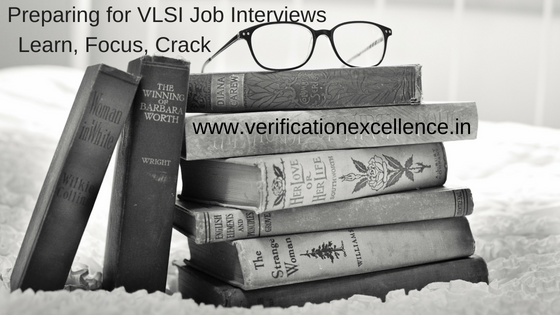Are you looking for a VLSI Job? The first process is to get a resume that stands out and get you shortlisted. (Read Creating Good Resumes first ) Once you get pass this, you should not miss the opportunity to crack through hiring process. Put some focus and dedicated practice to prepare for the written tests and interviews. VLSI Job Interviews needs focussed preparation and dedication and can be easily cracked.
Most of the VLSI companies like Qualcomm, Intel, Broadcom, ARM, Nvidia and many others hire fresh graduates from campus either as direct employees or as interns. VLSI companies may also conduct offline recruitment drives for fresh graduates as well as consider candidates through employee reference. Some of the companies also offer internships or direct contract opportunities and if you perform well, it can lead to conversion as full time employees. For all of these VLSI job interviews are a crucial process.
The hiring process can vary based on candidate experience – may include written tests for entry level engineers to several rounds of technical interviews. And for most selection process, there would also be a behavioral round of interview.
VLSI – Job Opportunities
VLSI is a broad spectrum of technologies and there are several sub categories of jobs that companies offer.
Note: If you want to know in more depth – read VLSI Front end vs Back End – Opportunities . You might also be interested in reading about opportunities and Career path for Electronics Engineers
In summary, there are three to four broad categories
1) Front end design jobs (RTL design, microarchitecture, Functional Verification, Synthesis etc),
2) Back end design jobs (Floorplanning, Placement and routing, Timing and Clock Tree synthesis etc)
3) Silicon Validation and Testing (HW and SW framework and test generation for silicon testing in lab)
4) EDA jobs (Electronic Design and Automation – Simulators, emulators and other tools needed for chip design)
A lot of the interview topics – be it for written tests or for interviews – will be common for entry level engineers across all domains. Following topics are important among these. Most of them should fall under subjects that you already studied part of regular curriculum.
In addition if a candidate is already experienced in a specific domain, then the interview process will focus more deep into his specific area of expertise. For entry level engineers, the academic projects and internships could also be focused in interviews.
Digital Electronics/Digital Logic/Computer Architecture:
This forms very important part of any VLSI interview and can include questions related to Combinational/Sequential circuits, logic design using Gates, State machines, etc. Since more digital designs are trending to System on Chip designs, computer architecture is also a related subject and needs preparation in terms of Processor and Cache architecture, knowledge of different Bus Protocols and Architectures etc
Programming Basics/HDL:
For a front end RTL design or functional verification job, software skills are becoming increasingly important along with hardware skills. There can be questions related to basic programming concepts and Hardware Description languages like Verilog, SystemVerilog, C and Object Oriented programming concepts. Level of difficulty can very based on experience and for front end jobs and may vary from basic concepts to programming questions or design implementation , verification methodologies and scripting languages like Perl/Python etc.
MOS Transistors/Circuits/Clock Tree:
For a backend design job, it is important to understand the MOS transistor theory, process technologies, cross talk and transmission line effects, Clock Tree and Power distribution mechanisms, Timing analysis, buffer modelling etc.
Logical Reasoning/Aptitude:
Test of problem solving skills. Sometimes Aptitude and programming questions are combined and candidates are asked to solve a aptitude question using a program.
Behavioral Interview :
In addition to having strong technical skills , behavioral skills form an important part of any company’s work culture and hence this also need some basic preparation. Questions like your interests and passions, strengths and weakness, short and long term career goals, your ability to work in teams and handle conflicts etc are judged in this round.
Resources for Preparation:
In terms of resources, your course text books are the best to refresh your fundamental concepts. In addition, a good amount of practice through Questions and Answers, problem solving will help build confidence to face more similar questions.
It is good to go through a collection of online questions and answers as well as discussion forums as a continuous practice to make yourself competent.
However you will also need a dedicated and focussed preparation towards your interview date.
The book – “Cracking Digital VLSI Verification Interviews: Interview Success” has been written with this in mind.
Also check out other Interview Resources and Verification Excellence Blogs
Lastly if you have a question, reach out or do check out the Quora Q&A

